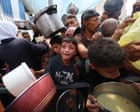Twelve-year-old Ahmad Zeidan’smother was shot and killedin front of him as she tried to secure food for her starving family at one of Gaza’s new US-backed distribution points. He lay beside her body for hours, afraid to stand up and run because any movement might cause his death.
His mother’s death was one of many over the past few days at the hands of Israeli forces on the way to or at facilities operated by the Gaza Humanitarian Foundation (GHF). On Sunday 1 June,more than 30were killed. On Monday 2 June,three were killed. On Tuesday 3 June,27 were killed. Sunday 8 June,four killed. Tuesday 10 June,17 killed. On Wednesday 11 June,60 peoplewere reported killed.
InGaza, hunger has been used as a weapon of war since the beginning of the genocide to weaken and control us. When the US humanitarian aid started to prepare distribution points to provide food supplies to people in Gaza, they offered a glimmer of hope that this hunger would finally be relieved. Now there is no hope. These aid points have become death traps.
At Netzarim distribution point, people weak with hunger walked up to 15km over hot sand but, on arrival, were stopped at barriers and forced to pass through them one by one. Then they were led into an area surrounded by fences, where boxes of basic supplies were scattered on the ground, triggering frantic scrambles. People fought desperately to reach them.
Some took only items they deemed valuable such as flour, which has become unaffordable, and left the rest behind. There were no clear systems to prioritise vulnerable individuals such as widows, the injured or elderly people. The scene resembled throwing meat into a cage of starving lions and watching them fight for survival. Of course, only the strongest win.
After only 10 or 15 minutes, tanks began approaching the fences and opened fire on the crowd shooting at everyone, young and old alike. People began running, desperate to escape. Some carried the little they managed to grab, others fled with empty hands. They saw people falling around them, but couldn’t stop to help. Stopping meant dying.
Some made it out alive from their visits to aid points. I heard my neighbour returning from a trip that lasted more than four hours. He was calling to his children: “Baba, Baba, I brought you bread! Baba, I brought you sugar!” I looked through the window and saw his children screaming with joy and hugging him. He was dripping with sweat, wearing only a vest. His shirt was tied to his back, filled with the small amount of aid he’d managed to gather.
People are desperate. People are hungry. We are not bad people. We are not violent or wild. We are people who value our dignity more than anything. But the hunger we are facing is indescribable. Food is a right, not a privilege to be fought for. The famine we are living through is indescribable. There is simply nothing to eat. When we go to the markets, there is nothing available. The roads are full of armed men who target the weak to take any aid they do manage to access. Then the merchants take it and sell it at hugely inflated prices.
By contrast,Unrwa’s aid systemoffered a different model, one that was structured, humane and community-based. My father, who is a teacher in Unrwa schools, used to work with them in distributing food stamps and supplies to the people. Aid was handed out by familiar, trusted community members – teachers, neighbours – under the protection of local security. Most importantly, people were treated with dignity.
The system was divided into monthly rounds, starting with large families and then moving down to smaller ones, each family having a registration number. Every family in Gaza used to receive their fair share through this system – flour, gas, sugar, oil and other essentials – all distributed through coupons in an orderly and dignified way.
Even though there weren’t many types of food available, at least we did not starve. We had enough to eat, to fill our stomachs. Today, we are starving. This is so-called humanitarian aid. But it is anything but humanitarian. It is humiliation, nothing more.
Esraa Abo Qamar is a writer based in Gaza
